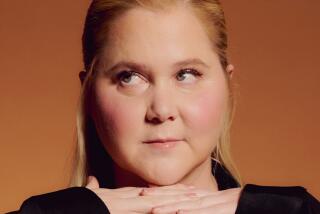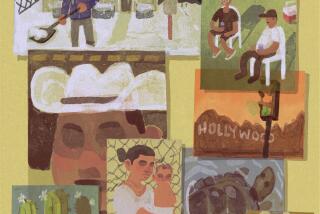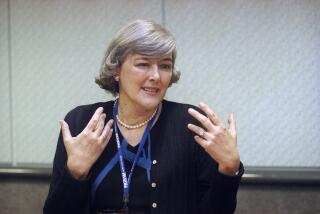Beverly Hills Siblings Find the Rhodes Friendly on the Way to Oxford : 1st Brother-Sister Combination to Win Coveted Scholarship
- Share via
WASHINGTON — When they were children, Elizabeth Sherwood and her little brother, Ben, were sent to Switzerland in the summers to learn to speak French.
It was not at all a typical upbringing, even for Beverly Hills kids. And the Sherwoods did not turn out to be typical young adults, or even ordinary high achievers. They recently became the first American sister-brother duo to win Rhodes scholarships to Oxford.
Elizabeth, now 26, won her Rhodes scholarship in 1981 after she graduated magna cum laude from Harvard University, and Ben, a 22-year-old Harvard senior, just learned that he won his Rhodes. He will head for Oxford in October.
Highest Student Achievement
Each year about 1,200 Americans apply for Rhodes scholarships and only 32 receive them. It is widely considered the highest student achievement in the academic world.
The Sherwoods’ remarkable story is not one of overcoming adversity--at least not the usual adversity.
Theirs is the story of children of privilege who made the most of their gifts and would like to give something back to a world that has been astonishingly good to them.
It is also the story of being different, and understanding all that that can mean.
“I have my own neuroses. Everybody has them,” said Elizabeth, who graduated from Beverly Hills High School a year early, spent a year at the Sorbonne, four years at Harvard, two years at Oxford and is now the top foreign affairs specialist on the staff of Sen. Joseph Biden (D-Del.), a name increasingly mentioned in connection with a presidential candidacy.
Besides her obvious intelligence, Elizabeth is also slim, attractive, blond, fashionable and outgoing. Occasionally she will dash off for a weekend of skiing at the Adirondacks.
“I know that people look at me,” Elizabeth continued, “and think that things look awfully good. And I’m conscious of it.
“My life has been blessed and I have not suffered hardship, and I know that. I try very hard to pay attention to and listen to people who may not have been so lucky, to somehow come out of myself and not be somebody who’s difficult for them to cope with. I mean, that’s hard work. I really don’t want to be somebody who puts people off.”
Important Discovery
Elizabeth’s father, Richard E. Sherwood, an attorney with the Los Angeles firm of O’Melveny & Myers, said that when his daughter was 15 she made an important discovery about herself while attending a summer session at a leading New England secondary school, Phillips Academy Andover.
“It was the first place she ever realized it was OK to be a smart girl, that she didn’t have to cloak it under all sorts of guises,” her father said.
“There is a tension,” he continued, “between wanting to be part of the social scene and at the same time having an intellectual capacity that may have been a little bit stronger than some of your peers.”
Ben Sherwood also has had to work hard to fit in with others his own age while darting in and out of a more adult world that tended to find his enthusiasm quite charming. Ben has, for his age, a long and unusual list of activities. Besides maintaining an A-minus average at Harvard, he has interned at CBS in New York, at the Los Angeles Times in Washington and Paris, and at the Raleigh, N.C., News and Observer. He has worked for a U.N. border relief agency on the Thailand-Cambodian border, plays chess with a computer, has tried sumo wrestling in Japan, speaks French, Chinese and Russian, won a disco dancing contest with his eccentric grandmother and does mime and magic tricks--he even listed magic as one of his interests on his Rhodes application.
But one of his most outstanding skills is forensics. At Harvard School (a private high school for boys) in North Hollywood, he did not handle his debating success with “appropriate modesty,” he said, and, even in college, he did not always turn off his debater persona in social situations.
“I like to think that I’m controversial because I have opinions about things and I care passionately about certain things. And I think that sometimes it is not particularly popular to care passionately about gun control or current events,” Ben said.
“I’m not reluctant to make waves when sitting at a dinner table with a group of classmates when one person says something I disagree with. And Machiavelli, who is widely misunderstood, said that in the long run it’s not that important to be popular because popularity is fleeting but respect is permanent.”
So, does he feel he was more respected than popular at Harvard?
“I don’t know whether I was respected,” he said, laughing.
“I’m uncomfortable suppressing my feelings.”
Getting along better with his own age group is something he’s “been working on the last few years,” and things have improved, he said.
‘A Great Year’
“My first year (at Harvard) I had a great year personally. I did better than I expected in my classes, got on the Crimson (newspaper) and played rugby. I think I was a little full of myself,” said Ben, who was in Washington working on his thesis on racism and the 1984 North Carolina Senate race. “If I made mistakes early on,” he said, “I think they were erased.”
Three months spent on the Cambodia-Thailand border working with refugees provided a stark contrast to the life he had known growing up in Beverly Hills, attending the best private schools, belonging to a country club and traveling around the world.
“When you go to a refugee camp it’s very difficult to figure out why I happen to have been born on Elm Drive and they were born at Site 7 Evacuation Camp in Thailand,” Ben said.
“When I came back a lot of my friends looked at me and they said, ‘Ben, what was it like being in Beverly Hills after having lived at Site 7 for the better part of three months?’--this sprawling, steaming camp with 55,000 people in it who have nothing, just huts and people.
“I had the distinct impression they expected me to come back from this experience and reject the country club and the house and the family and the servants and the Hollywood Bowl.
“I could have done that. And it would have been outrageous and it would not have accomplished very much. You don’t have to reject Beverly Hills and Hillcrest Country Club to want to care about people elsewhere.
“I am very aware of how privileged I am and how lucky I am and when I look at poor people, I don’t feel guilty that I have what I have. Nor does any sense of guilt necessarily motivate me to give immunizations to Khmer Rouge babies on the border in Thailand. What does motivate me to do things is a sense of duty. With privilege there are certain responsibilities and duties.”
How does it happen that one family produces two Rhodes scholars--in two opportunities?
Many families have as much or more money and opportunity yet still find themselves struggling with the same problems so many other American parents face: drug abuse, laziness, rebellion, or just the ordinary failure to make the most of one’s ability.
What did the Sherwoods do differently?
“We really don’t have a recipe,” said Dee Sherwood, an energetic, non-working mother who made the children and community activities the center of an active life.
“We’ve just been very lucky,” she said.
But there was more than luck.
Both Elizabeth and Ben are known as extremely hard workers. And while they had much to work with, their accomplishments have not come easily.
Asked what the hard parts of her life had been, Elizabeth replied, “a lot of hard work. Writing a doctoral dissertation, for example, is extremely painful.
“And some of the hard parts come in needing to listen to your insides and knowing that you’re doing what you’re doing because it means something to you and not because other people have expectations of you.”
Boundless Enthusiasm
Ben was--and still is--legendary in the Times Washington Bureau for working long hours with boundless enthusiasm and bold, slightly off-the-wall ideas during his internship in the summer of 1982.
“I found Washington such an exhilarating place,” he said, “and since I was only going to be here three months I couldn’t justify not working seven days a week.”
Ben’s most remembered Washington story may have been one he submitted against the editors’ wishes, chronicling the continuing saga of the National Zoo pandas’ failed efforts to produce offspring. After reading the story, the editors changed their minds and ran it.
The panda story was perhaps surpassed only by his story from the Paris bureau three years later on dogs who dine in French restaurants, leaving behind something less desirable than a tip.
Hard work is something that has been second nature to Elizabeth and Ben, ever since they were children. Summers, for instance, were always filled with learning projects, beginning with several trips to a farm in Switzerland to learn French--a move which, they like to point out, was no more expensive than an American summer camp.
Closeness Limited Competition
It was those summers, Elizabeth said, that drew her and Ben much closer than a sister and brother might otherwise be, “because we were the only ones who spoke English.” Their closeness limited competition and arguments between them.
If the family took a trip to India or Japan or the Soviet Union, that, too, would take place within an educational framework.
“My role,” Dee said, “was involved with our total passion about doing things with the children. That was really the point of our travel.
“When we traveled, the children were responsible for understanding the political structure of the country, and they had to endure museums and new food. The purpose was to learn, not just go lie down on the beach. No one went to the Riviera.”
Another striking difference between the Sherwoods and other families seems to be their high level of communication and the parents’ willingness to let the children make important decisions for themselves once a topic had been thoroughly discussed.
Up to the Children
After attending the UCLA University Elementary School, which experiments with innovative teaching and grading methods, it was up to the children to choose where they would go to high school and college. Elizabeth attended a public high school, while Ben chose a private boys’ school, “to stay off Liz’s track,” Dee said. “We made an effort to keep him off Liz’s track so he would not be measured by Liz.”
“Occasionally,” Dick Sherwood said, “Elizabeth would essentially test us, making an outrageous proposition to see if it would be accepted. But we would just discuss it, and she would make a choice herself.”
Both parents stressed the importance of parents being good listeners, and there was always lots of conversation.
“Dee’s rule was that I had to be present at breakfast and as many dinners as possible, even if the kids had to wait to eat until I got home from the office,” Dick Sherwood said. “We spent a lot of time talking about their problems and doings, as well as what was happening in the world.”
Access to Credit Cards
Remarkably, there were no rules about curfew or homework, and the children had “free access to credit cards,” Dee said, “which they used very judiciously.
“Money has not been a carrot or a stick. It’s just their responsibility to use good judgment.”
Good judgment with money also meant that the children were not showered with frivolous gifts or rewards.
“Unlike her friends, Elizabeth did not receive the key to a new car on her 16th birthday,” Dick Sherwood said.
There were rules limiting television-watching, which Ben would circumvent by sneaking with a bowl of Cheerios into a room where he would quietly watch movies after school.
And like all kids, they had their moments that parents would rather forget.
“They went through quite normal high spirits,” Dick said, remembering that once on a trip to Lake Tahoe he pulled the car off the road and spanked both children for making too much noise. But there was not a great deal of punishment in the household.
“Educators would frown on us,” Dee said. “We are very ineffectual punishers. It always was back to talking.”
Great Role Models
Both Ben and Elizabeth expressed great admiration for their parents and said they thought of them as role models. Now the family runs up tremendous phone bills talking to each other, and Dick sends them a steady stream of newspaper and magazine clippings in the familiar 8x10 Manila envelopes of his law firm.
“Growing up in my family,” Ben said, “watching my mother and father the way they fit into the community, I’ve always felt it’s not good enough to be a self-absorbed person, that it’s ultimately more important to put something back into the community.”
The Sherwoods are especially known in the Los Angeles area for their involvement and support of the Los Angeles County Museum of Art (Dick was president and chairman of the museum board, while Dee has served on various arts groups). At Oxford, Ben hopes to take an in-depth look at the growing problem of the world’s refugees, and is currently focusing on journalism or politics as future occupations.
Ben’s and Liz’s preference for public-service fields sets them apart from many of their classmates at Harvard who have gone on to six-figure salaries on Wall Street, or into big law firms.
“We fight quite often about the contribution that they make to society working as young associates on Wall Street, versus the contribution a journalist makes in North Carolina or a relief worker makes in the Sudan,” Ben said. He said he respects their choice, but, “Wall Street wouldn’t be for me.”
Elizabeth began her political activities at age 13, waging a one-girl letter-writing campaign to the Hillcrest Country Club, protesting the limitations placed on the hours that girls could use the tennis courts. She succeeded in getting the limitations removed.
There is enough feminist still left in her that when the first American brother and sister won Rhodes scholarships, “I like it that the sister won it first,” she said.
Spent Summers Interning
During her college years Elizabeth spent summers interning for California Sen. John Tunney, the Department of State and Foreign Affairs magazine. The summer between her two years at Oxford was spent as an intern on the Los Angeles Times foreign desk. Prior to taking her current job with Sen. Biden, she worked at the Department of State and the Brookings Institution, a respected Washington think tank. She speaks French and Spanish and this week had her doctoral dissertation formally accepted by Oxford. It is titled “The Alliance Beyond Europe: NATO and the Non-Atlantic World.”
Ben came to Washington for a couple of weekends to edit her dissertation, scratching his way through it with a red pen.
“This was a great gift,” she said, “from what I had always looked at as my useless baby brother.
“It was a wonderful moment for the two of us because he had really come into my life as a colleague and partner and equal, and I just adored it.”
The two are obviously very close and quite fond of each other, and should one of them become romantically involved, the person must pass muster with the sibling--not always an easy task.
This practice began quite early, when Elizabeth was first dating at age 14 and Ben was 10.
“Liz had a boyfriend who came to our home to pick her up in his brand new, fancy car,” Ben said, asking first for Liz’s permission to tell the story.
“Out of jealousy or concern, I hid in the bushes in our driveway,” he said. “We have a very long driveway. And I put up a bunch of red safety worker cones in the street to see how careful he was in backing down the driveway, to see if he paid attention--or if he ran them over, I would have proof that he was not responsible enough for my sister.” (Liz’s date passed that test.)
Both are enthusiastic about the future, and “they joke,” their father said, “about what jobs they will have in the other’s presidential administration.”
The parents clearly enjoyed talking about their children and their many adventures growing up. But their mother suddenly departed from character, saying: “It makes me sad to think about these things. I’d like to do it all over.”
“Me, too,” her husband said.



